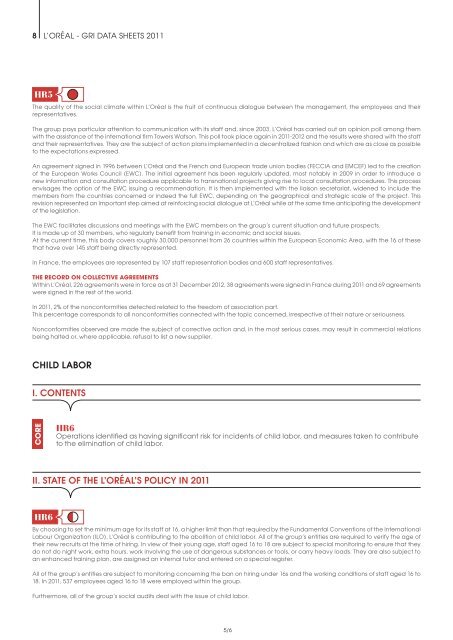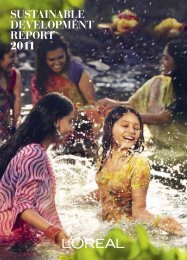Organizational Strategy - Sustainable Development - L'Oréal
Organizational Strategy - Sustainable Development - L'Oréal
Organizational Strategy - Sustainable Development - L'Oréal
Create successful ePaper yourself
Turn your PDF publications into a flip-book with our unique Google optimized e-Paper software.
8 L’OréaL - GrI DaTa SHEETS 2011<br />
HR5<br />
The quality of the social climate within L’Oréal is the fruit of continuous dialogue between the management, the employees and their<br />
representatives.<br />
The group pays particular attention to communication with its staff and, since 2003, L’Oréal has carried out an opinion poll among them<br />
with the assistance of the international firm Towers Watson. This poll took place again in 2011-2012 and the results were shared with the staff<br />
and their representatives. They are the subject of action plans implemented in a decentralized fashion and which are as close as possible<br />
to the expectations expressed.<br />
an agreement signed in 1996 between L’Oréal and the French and European trade union bodies (FECCIa and EMCEF) led to the creation<br />
of the European Works Council (EWC). The initial agreement has been regularly updated, most notably in 2009 in order to introduce a<br />
new information and consultation procedure applicable to transnational projects giving rise to local consultation procedures. This process<br />
envisages the option of the EWC issuing a recommendation. It is then implemented with the liaison secretariat, widened to include the<br />
members from the countries concerned or indeed the full EWC, depending on the geographical and strategic scale of the project. This<br />
revision represented an important step aimed at reinforcing social dialogue at L’Oréal while at the same time anticipating the development<br />
of the legislation.<br />
The EWC facilitates discussions and meetings with the EWC members on the group’s current situation and future prospects.<br />
It is made up of 30 members, who regularly benefit from training in economic and social issues.<br />
at the current time, this body covers roughly 30,000 personnel from 26 countries within the European Economic area, with the 16 of these<br />
that have over 145 staff being directly represented.<br />
In France, the employees are represented by 107 staff representation bodies and 600 staff representatives.<br />
THE RECORD ON COLLECTIVE AGREEMENTS<br />
Within L’Oréal, 226 agreements were in force as at 31 December 2012, 38 agreements were signed in France during 2011 and 69 agreements<br />
were signed in the rest of the world.<br />
In 2011, 2% of the nonconformities detected related to the freedom of association part.<br />
This percentage corresponds to all nonconformities connected with the topic concerned, irrespective of their nature or seriousness.<br />
Nonconformities observed are made the subject of corrective action and, in the most serious cases, may result in commercial relations<br />
being halted or, where applicable, refusal to list a new supplier.<br />
CHILD LABOR<br />
I. CONTENTS<br />
CORE<br />
HR6<br />
Operations identified as having significant risk for incidents of child labor, and measures taken to contribute<br />
to the elimination of child labor.<br />
II. STATE OF THE L’ORÉAL’S POLICY IN 2011<br />
HR6<br />
By choosing to set the minimum age for its staff at 16, a higher limit than that required by the Fundamental Conventions of the International<br />
Labour Organization (ILO), L’Oréal is contributing to the abolition of child labor. all of the group’s entities are required to verify the age of<br />
their new recruits at the time of hiring. In view of their young age, staff aged 16 to 18 are subject to special monitoring to ensure that they<br />
do not do night work, extra hours, work involving the use of dangerous substances or tools, or carry heavy loads. They are also subject to<br />
an enhanced training plan, are assigned an internal tutor and entered on a special register.<br />
all of the group’s entities are subject to monitoring concerning the ban on hiring under 16s and the working conditions of staff aged 16 to<br />
18. In 2011, 537 employees aged 16 to 18 were employed within the group.<br />
Furthermore, all of the group’s social audits deal with the issue of child labor.<br />
5/6






